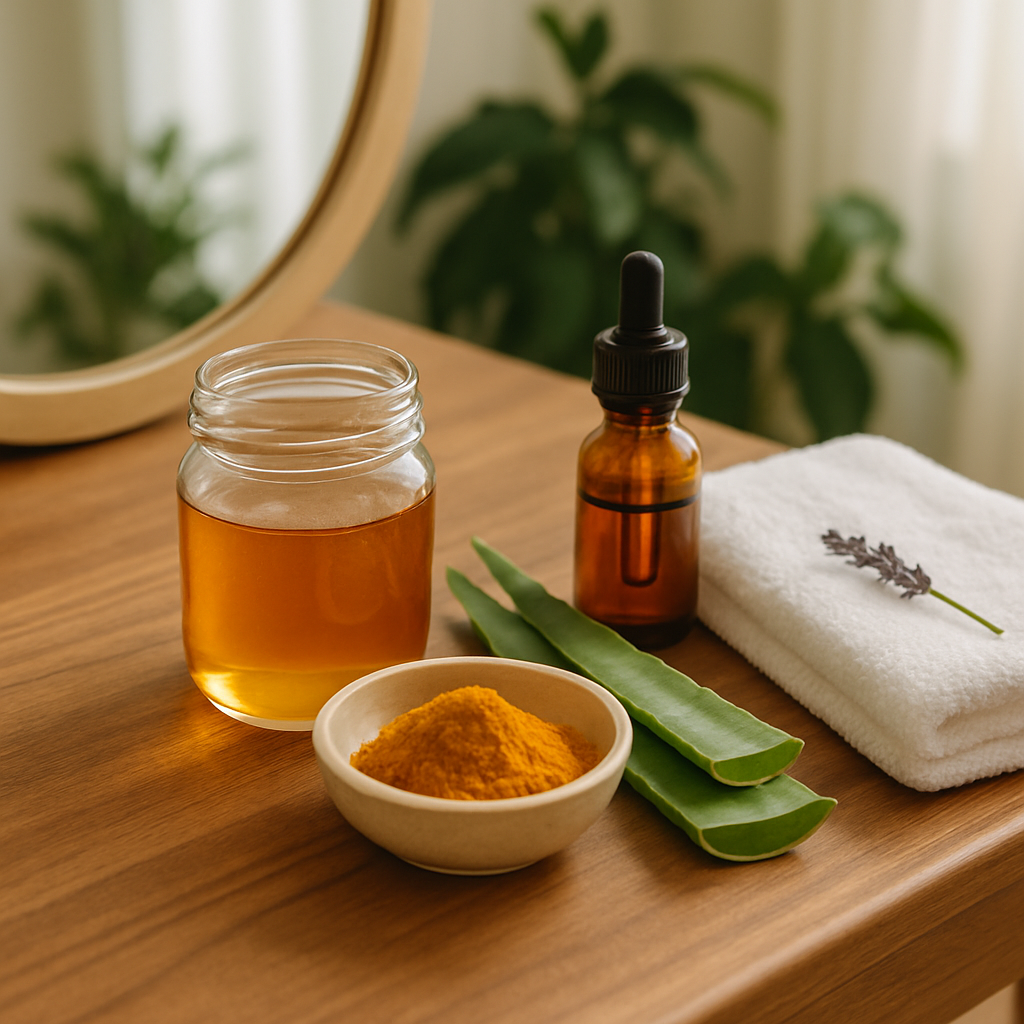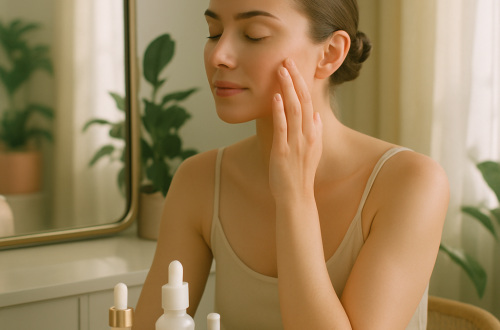The Ultimate Guide to Natural Skincare Ingredients for Every Skin Type

Nature offers a treasure trove of skincare ingredients that can transform your routine. The shift toward natural formulations isn’t just a passing trend it’s a recognition that plant-based compounds often provide gentle yet effective solutions for skin concerns. Finding the right natural ingredients for your specific skin type can simplify your regimen while delivering remarkable results.
The beauty of natural skincare lies in its simplicity. Rather than deciphering complex chemical names on product labels, you can turn to ingredients that have been used for centuries across cultures. From calming chamomile to nourishing shea butter, nature provides options for every skin need.
The Foundation of Natural Skincare
Natural skincare begins with understanding your skin’s unique needs. Each skin type oily, dry, combination, sensitive, or mature responds differently to various botanical ingredients. The key is identifying which natural compounds address your specific concerns without causing irritation.
Many people turn to natural ingredients after experiencing reactions to synthetic formulations. I remember my own journey began after developing an uncomfortable rash from a popular drugstore moisturizer. That experience led me to research plant-based alternatives, and I was surprised by how effectively simple ingredients like aloe vera calmed my irritated skin.
Pure plant oils often serve as the backbone of natural skincare routines. These oils contain fatty acids, vitamins, and antioxidants that nourish the skin barrier. Contrary to popular belief, certain plant oils can actually benefit oily skin types by helping to regulate sebum production rather than exacerbating it.
Water-based hydrators like aloe vera gel and rose water provide lightweight moisture without heaviness. These ingredients deliver hydration while soothing inflammation a perfect combination for most skin types.
For those with sensitive complexions, patch testing remains essential even with natural ingredients. Apply a small amount of any new product behind your ear or on your inner wrist, and monitor for 24-48 hours before applying to your face.
The effectiveness of natural ingredients often comes from their synergistic properties. While a single synthetic compound might target one specific concern, botanical ingredients typically contain multiple beneficial components that work together. This holistic approach explains why traditional remedies have endured for generations.
Natural Ingredients for Different Skin Types
If you have oily or acne-prone skin, certain natural ingredients can help balance oil production without stripping your skin. Tea tree oil contains antibacterial properties that target acne-causing bacteria. Use it as a spot treatment (diluted with a carrier oil) rather than applying it all over your face.
Witch hazel serves as a gentle astringent that removes excess oil without causing dryness. Look for alcohol-free formulations to avoid potential irritation. I’ve found that keeping a small bottle of witch hazel toner in my gym bag helps refresh my skin after workouts without triggering breakouts.
Clay masks work wonders for absorbing excess oil and drawing impurities from congested pores. Kaolin clay offers a gentler option for those who find bentonite clay too drying. Using a clay mask once weekly rather than multiple times can prevent over-drying.
For dry skin, plant oils rich in fatty acids provide deep nourishment. Avocado oil penetrates the skin with vitamins A, D, and E, while argan oil delivers moisture without feeling greasy. Layering a few drops of oil under your moisturizer can enhance hydration during colder months.
Shea butter creates a protective barrier that locks in moisture for extremely dry skin. Its concentration of vitamins and fatty acids makes it particularly effective for rough patches on elbows, knees, and heels. Some people find pure shea butter too heavy for facial use, but it works beautifully when incorporated into a balanced formula.
Hyaluronic acid, though often manufactured in labs, does occur naturally in our bodies and some fermented plant sources. This molecule holds up to 1,000 times its weight in water, making it exceptional for adding moisture without heaviness. Apply it to damp skin for optimal absorption.
Sensitive skin benefits from anti-inflammatory botanicals. Chamomile extract soothes redness and irritation with its bisabolol content. Calendula, derived from marigold flowers, calms reactive skin while supporting healing. Both ingredients have been used medicinally for centuries across different cultures.
Oat derivatives, particularly colloidal oatmeal, provide remarkable relief for itchy, irritated skin conditions. The compounds in oats form a protective barrier while delivering anti-inflammatory benefits. I keep a simple oat mask mixture (ground oats and water) in my bathroom for those occasional skin flare-ups.
Combination skin responds well to balancing ingredients like green tea extract. Rich in polyphenols, green tea helps regulate oil production in the T-zone while providing antioxidant protection. Honey serves as another versatile ingredient for combination skin, offering both hydration and mild antibacterial properties.
Mature skin benefits from antioxidant-rich botanicals that fight free radical damage. Rosehip oil contains vitamin C and lycopene that brighten skin tone while supporting collagen production. Sea buckthorn oil, with its vibrant orange hue, delivers a potent dose of omega fatty acids that strengthen the skin barrier.
Plant-based retinol alternatives like bakuchiol offer similar benefits without the irritation often associated with conventional retinoids. This ingredient, derived from the babchi plant, stimulates collagen production while being gentle enough for sensitive skin types.
I’ve noticed that most natural skincare enthusiasts develop a small collection of multi-purpose ingredients rather than accumulating dozens of specialized products. This minimalist approach not only simplifies your routine but often yields better results by giving your skin time to respond to consistent care.
The concentration and quality of natural ingredients matter significantly. A product containing a small amount of botanical extract at the end of its ingredient list likely won’t deliver noticeable benefits. Look for formulations where the active naturals appear earlier in the ingredient list, indicating higher concentration.
Storage affects the potency of natural ingredients. Plant oils and vitamin C derivatives oxidize when exposed to light and air, potentially reducing their effectiveness. Store these products in dark bottles, away from direct sunlight and extreme temperatures.
Some natural ingredients work better during specific seasons. Lighter hydrators like aloe and cucumber extract suit summer months, while richer butters and oils provide necessary protection during winter. Adapting your natural skincare routine to seasonal changes helps maintain skin balance year-round.
When incorporating natural ingredients, patience remains essential. Botanical actives often work more gradually than their synthetic counterparts, with results becoming visible over weeks rather than days. This gentler approach typically means fewer side effects but requires consistency.
The environmental impact of natural skincare deserves consideration too. Sustainable sourcing practices protect both ecosystems and the potency of botanical ingredients. Wild-harvested plants often contain higher concentrations of beneficial compounds compared to mass-produced alternatives, as they develop these substances in response to environmental stressors.
Natural skincare doesn’t have to be complicated or expensive. Simple kitchen ingredients like honey, yogurt, and oatmeal can create effective treatments for various skin concerns. The most sustainable approach often involves using fewer, higher-quality ingredients rather than constantly chasing the latest botanical trend.
Finding your perfect natural skincare routine takes time and experimentation. Pay attention to how your skin responds to different ingredients, and don’t hesitate to adjust your approach as needed. Your skin’s needs may change with seasons, hormonal fluctuations, and age the beauty of natural ingredients lies in their adaptability to these shifting requirements.
The world of natural skincare offers something for everyone, regardless of skin type or concerns. By understanding the properties of different botanical ingredients, you can create a simple, effective routine that supports your skin’s health without unnecessary complexity. Trust in the wisdom of traditional ingredients while remaining open to innovations in natural formulations this balanced approach often yields the most satisfying results.


